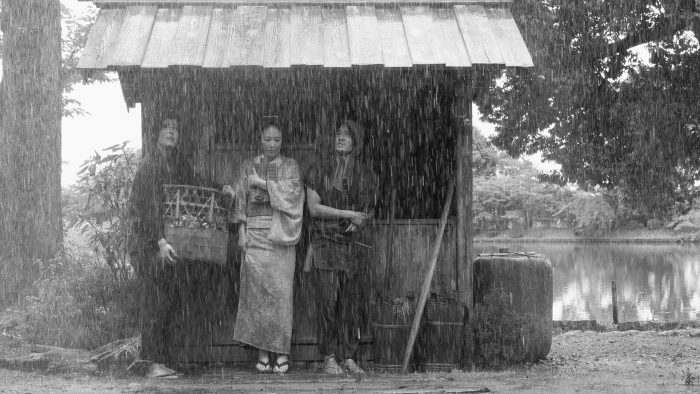Japan, 1858: Yasuke and Chunji work their way through the lower-class tenement housing complexes of Edo (nowadays Tōkyō) – the former collecting poop, the latter wastepaper. Chunji’s work is cleaner but Yasuke’s more lucrative, as his findings sell for serious money to the peasantry as quality manure. The two decide to join forces – the more human droppings get secured, the more dough both will make. While getting used to shoveling feces, Chunji meets Okiku, the daughter of a samurai fallen on hard times. Love is already as such difficult – but when questions of social standing come into play in a society entirely defined by class, things can get maddeningly complex between a doo-doo entrepreneur and a school mistress…
Sakamoto Junji’s fundamental strength is his extraordinary passion for playing around with genres, tropes, motives – making each and every film a new adventure in convention bending if not outright breaking. Okiku and the World offers a lot of that: we do get to explore a social cosmos rarely seen in Japanese historical films, the urban lower classes, with an attitude that is unexpectedly rustic and funny while open-minded, tender, and socio-politically alert. Add to that a visual style that’s stunningly beautiful even when showing slightly iffy exercises, and you get an idea of the kind of rare treat on offer here: an intelligent and engaging film aimed in the most genuine fashion at absolutely everybody – a democratic film exploring the conditions needed for democratic behavior. Yes, shovelling shit shows the way!
SAKAMOTO JUNJI (b. 1958) has been venerated by Japanese critics and audiences alike ever since his debut Knockout (1989) – while the rest of the world ignored him almost completely safe for a few exceptions like the Fukasaku Kinji-revision Another Battle (2000) and the Berlinale competition entry KT (2002). Too bad, for it missed masterpieces galore, like his various boxing movies (Tekken, 1990; Boxer Joe, 1995; Joe no ashita: Tatsuyoshi Jōichirō tono 20-nen, 2015), his formidable essays on crime and not always punishment (Tokarev, 1994; Children of the Dark, 2008; The Human Trust, 2013), the tense submarine drama Aegis (2005), the political biography Ernesto (2017), or the wonky science fiction extravaganza My Brother, The Android And Me (2022). He’s the greatest film director in the world you’ve never heard of (one of about fifty).
Olaf Möller
